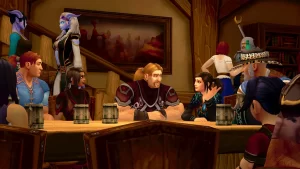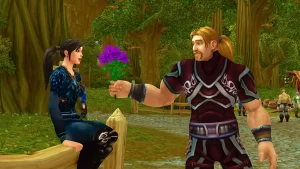Unveiling a Hidden Life: The Boy Who Found Freedom in World of Warcraft
4 min read
The recent documentary The Remarkable Life of Ibelin sheds light on the extraordinary virtual life led by Mats Steen, a Norwegian gamer who, unbeknownst to his parents, crafted a vibrant online persona in World of Warcraft while living with Duchenne Muscular Dystrophy (DMD). Mats passed away at 25 in 2014, leaving behind a legacy that his parents, Robert and Trude Steen, only began to comprehend after his death.
When Mats died, the Steens were overwhelmed by messages of condolence from across Europe, revealing the depth of relationships Mats had forged in the gaming world. Although they were aware of their son’s passion for gaming, they had no idea that he had spent nearly a decade immersed in the virtual realm of Azeroth, where he found a sense of freedom and connection that eluded him in real life.
“I leave this world and spend most of my time in a distant world called Azeroth,” Mats’s words, recited by an actor in the film, express his desire to break free from the physical limitations imposed by his condition. In this virtual space, he was not confined by his wheelchair; he could be anyone he wished.
For Robert and Trude, the revelation that their son had a rich social life filled with friendship and love was transformative. “We believed he lived a lonely and isolated life,” Robert reflects. After Mats’s passing, they shared a blog post about him, which prompted an outpouring of messages from his online friends recounting their meaningful interactions with him. This moment marked a turning point for the Steens, who began to understand the impact Mats had made in the lives of others.

The documentary, directed by Benjamin Ree, explores themes that resonate deeply in today’s digital age. Ree believes Mats’s story raises vital questions: Can genuine friendships form without physical meetings? Can love exist between avatars? And how do these digital connections compare to traditional relationships? Mats’s journey, as portrayed in the film, illustrates the generational shift towards embracing online interactions as meaningful and authentic.
The film is uniquely crafted, incorporating VHS footage of the Steen family along with animated sequences that bring Mats’s avatar, Ibelin, to life. His in-game experiences were meticulously documented, allowing Ree to portray Mats’s inner life authentically. Ibelin, named after a character from the film Kingdom of Heaven, became an extension of Mats—an idealized version of himself who could navigate Azeroth’s challenges with confidence.
In the game, Ibelin was described as a noble detective, dedicated to fighting evil and making friends. His presence was uplifting, and fellow players fondly recalled how he brightened their gaming sessions. One player even credited Mats with helping improve their mother-son relationship through his wise advice.
Another touching element of the documentary is Mats’s relationship with Lisette, a fellow gamer. Their virtual connection blossomed into a deep friendship, and Mats’s thoughtful letters to her parents, advocating for her right to game, highlighted his caring nature. “He was an incurable romantic,” a friend noted, revealing the tenderness with which Mats approached relationships.

Despite his illness, Mats found ways to express himself through his avatars, even creating a second persona, Jerome Walker, who reflected a more carefree and adventurous spirit. The film candidly addresses Mats’s frustrations and emotional struggles, revealing that his online alter ego allowed him to explore aspects of life that were otherwise out of reach.
As the documentary progresses, it becomes clear that Mats used his gaming experiences to cope with the challenges of his physical limitations. “In this other world, a girl wouldn’t see my wheelchair,” he shared, expressing the desire to be recognized for his character rather than his disability.
This poignant narrative not only highlights Mats’s strength and humor but also invites viewers to reconsider their perspectives on digital relationships. As Robert Steen reflects on his son’s online connections, he recognizes that future generations may view digital and physical friendships as equally valid. The friendships forged in the gaming world have proven to be significant, with members of Mats’s gaming guild even attending his funeral and continuing to honor his memory.
The Remarkable Life of Ibelin ultimately reveals the profound impact of virtual worlds on real-life experiences, challenging preconceived notions about isolation and connection in the digital age. Mats’s legacy endures, encouraging us to understand the complexities of love, friendship, and the human experience, both online and off.







